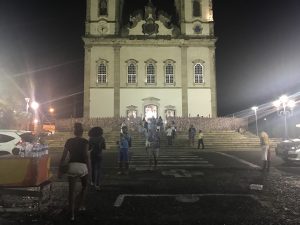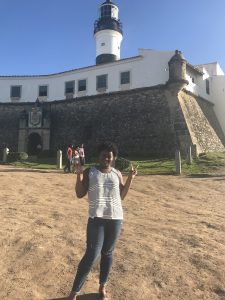Survival Portuguese class was over, and the scorching Salvador sun greeted us as we exited our classroom. Immediately a charged excitement filled the air as we boarded the Mariah Carey. The bus, Mariah Carey as we fondly called it, had extremely reclining seats, air-conditioning, and something else that we all longed for on our 10-hour flight from Atlanta to Rio and another 2 hours to Bahia, leg room. Yes! The Mariah Carey had leg room, and we sat comfortable on the bus with our phones pulled out ready for our panoramic tour of the still unknown city of Salvador.
Our tour guide Simone set the tone with an infectious laugh that echoed through the microphone and filled the Mariah Carey. She commanded our attention, and we were her doting audience. Her arms waved in a flourish that most certainly was her Bahian heritage as she identified neighborhoods, statues, and places that embodied the history and culture of Bahia. Our first stop was the temple of one of the Orishas celebrated and worshiped in Bahia. Yemanjá, the goddess of the seas, is one of the many Orishas adopted by the Bahians based on the state’s strong African influences. The orishas described by Simone are the same Orishas worshiped in the Yoruba tribe in Nigeria. As a Nigerian woman, listening to the extent of preparation involved when doing ceremonies and the magnitude of pride in their African influences and roots made me not only appreciate my heritage even more, but it also provoked a different kind of respect for the strength and the vastness of the African culture.
The rest of the tour featured neighborhoods and churches. One particular neighborhood that interested most of us was the Liberdade or “communities.” This neighborhood was founded originally on the hills of Bahia, and at the time it was the first place that emancipated African-Brazilian slaves could live after the abolishment of slavery in 1888. Today, the residents of these neighborhoods are still impoverished but have created hills of colorful and multi-storied buildings that house generation after generation. This densely populated area brings to mind the lecture presented that morning on Collective Health by Dr. Eduardo Gorta from the Federal University of Bahia.
The concept of Collective Health is still being defined, but the primary goal is to reduce health disparities amongst people. In Bahia, distinct neighborhoods like the Liberdade have certain factors, which include, but are not limited to race, sex, location, and socioeconomic status that affect the quality of healthcare and the sustainability of a healthy being. In other words, collective health officials use the government provided public health to serve people, but move a step further. They do not only treat the diseased state of the individual, but they consider the factors that may affect the populations’ health and their wellbeing prior to the diseases.
The day continued with multiple selfies, a group picture and a visit to a tile shop, where the owner made tiles and hand painted vibrant scenes on the tiles. Simone took us to a gelato shop where we all got uma bola – one scoop for eight reais and watched the sunset over Rua Porto dos Tainheiros. We also visited a famous church known for its miraculous powers the Praça Senhor do Bonfim. Saving the best for last, we ended the night in the best steak house in town the Boi Preto. Here my new friends and I filled our bellies with laughter along with delicious seasoned meat and strangely chicken hearts. The bus ride home was quiet and reflective, as some of us quietly discussed our day and the others went to sleep.




I absolutely love the part of this blog where you describe the pride you have in being Nigerian and the positive influence that African Heritage has played in Brazil, and really across this world. Brazil always feels like home to me. I can appreciate your feeling of pride. I hope you continue to experience things that awaken curiosity, pride and excitement as you continue your program.